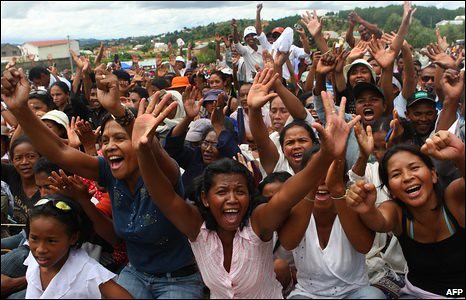
Madagascar supporters of President Marc Ravalomanana who was overthrown by the opposition and the military. The African Union has condemned the actions of the opposition and the military as a "coup.", a photo by Pan-African News Wire File Photos on Flickr.
Madagascar exiled president sent back to S.Africa
DONNA BRYSON
(AP) -- Madagascar's toppled president tried to end his exile in South Africa Saturday, but his commercial plane was forced to turn back mid-flight when his landing was blocked by the populist former disc jockey who toppled him.
Ex-President Marc Ravalomanana's Indian Ocean island has a long history of volatile politics, and the air standoff shows how personal rivalry can stand in the way of stability.
Ravalomanana has been exiled in South Africa since being toppled in 2009. When he tried to return last year, he was stopped at the Johannesburg airport after aviation authorities in Madagascar wrote to say he was not welcome.
Thousands of Ravalomanana supporters awaited his return at the capital's airport Saturday. But a government minister told reporters there that the politician who toppled him with military backing, Andry Rajoelina, had issued a notice closing the country's main airports to prevent the former leader's return.
Ravalomanana supporters slowly left the airport. Security forces fired tear gas to force the last of the crowds to retreat.
A frustrated Ravalomanana at first refused to leave the plane after it landed back in Johannesburg. After more than two hours, he agreed to be escorted to a hotel in Pretoria by South African government officials.
Hours earlier Ravalomanana, his wife, two aides, journalists and passengers not linked to him had boarded a commercial flight. Ravalomanana said he wanted to return to Madagascar to work for peace and democracy in his troubled homeland. He has already accepted a transitional government headed by Rajoelina that is supposed to oversee elections next year.
Friday, Ravalomanana had told reporters in Johannesburg that if he were to regain power in that vote, he would put into practice what he said he had learned during exile in South Africa about respecting the rule of law and freedom of expression.
South Africa saw brutal white minority rule peacefully toppled in 1994 and multiracial democracy installed through negotiations and power-sharing. Madagascar has little history of such constructive politics on which to draw.
A central figure in Madagascar's politics, Didier Ratsiraka, took over from military rulers in 1975 and led the country for 16 years, presiding over a socialist and highly centralized state and clamping down on the opposition. Ratsiraka lost key support because of a deadly confrontation between troops and demonstrators in 1991, and was defeated in elections the next year.
Ratsiraka emerged again to win in 1997. The next election in 2001 pitted him against Ravalomanana. The results were disputed and low-level fighting split the country between two governments, two capitals and two presidents before Ratsiraka fled to France in 2002.
Ratsiraka, who some believe backed Rajoelina's rise to exact revenge on Ravalomanana, returned to Madagascar in November after nearly a decade in exile.
Late Friday, South Africa's deputy foreign minister Marius Fransman, who has led regional efforts to restore democracy in Madagascar, issued a carefully worded statement noting "contextual challenges relating to the political situation in Madagascar." Then he called "on all the political formulations and the political leadership, in particular ... Mr. Andry Rajoelina and former President Mr. Marc Ravalomanana to exercise political maturity."
Members of the unity government under Rajoelina have been bickering over how positions have been filled. Saturday's events were likely to put further strain on the arrangement. They drew condemnation from Mamy Rakotoarivelo, a member of Ravalomanana's party who under the unity agreement is president of the transitional parliament.
"Andry Rajoelina still thinks he's solely in charge of the government," Rakotoarivelo told reporters in Madagascar. "It's unacceptable."
For months before the coup, Rajoelina led rallies against Ravalomanana, whom he accused of being out of touch with the sufferings of the country's impoverished majority.
Ravalomanana's government at one point blocked the signal of a radio station Rajoelina owned. In response, Rajoelina supporters set fire to a building in the government broadcasting complex as well as an oil depot, a shopping mall and a private TV station linked to Ravalomanana. Scores of people were killed.
Days later, soldiers opened fire on anti-government protesters, killing at least 25.
Friday, Ravalomanana told reporters he had nothing to do with orders to close the radio station or fire on demonstrators.
Following Rajoelina's military-backed coup, Ravalomanana was convicted in absentia of conspiracy to commit murder in a case related to the turmoil during the overthrow that forced him to leave. Ravalomanana called the tribunal appointed by Rajoelina illegitimate.
Security officials in Madagascar had said the toppled president would be arrested if he returned.
____
Associated Press reporters Jerome Delay in Johannesburg and Lova Soarabary in Antananarivo, Madagascar contributed to this report.
No comments:
Post a Comment